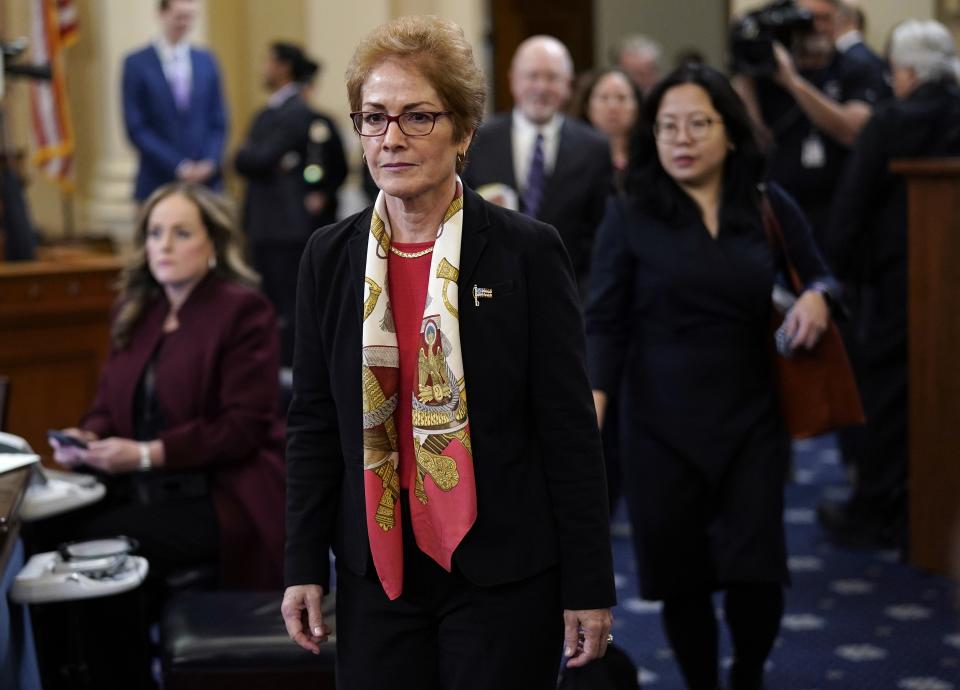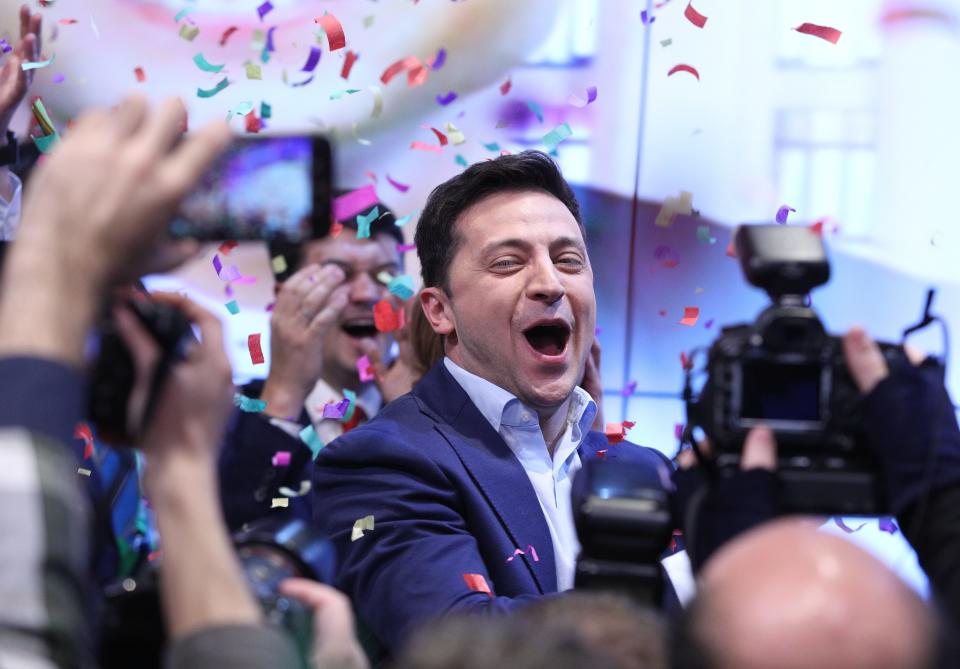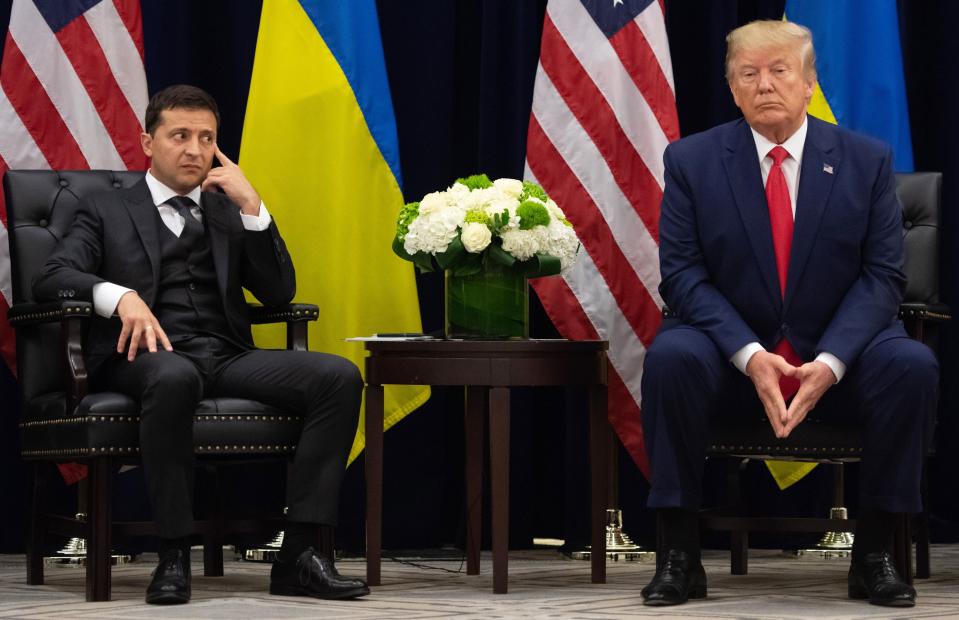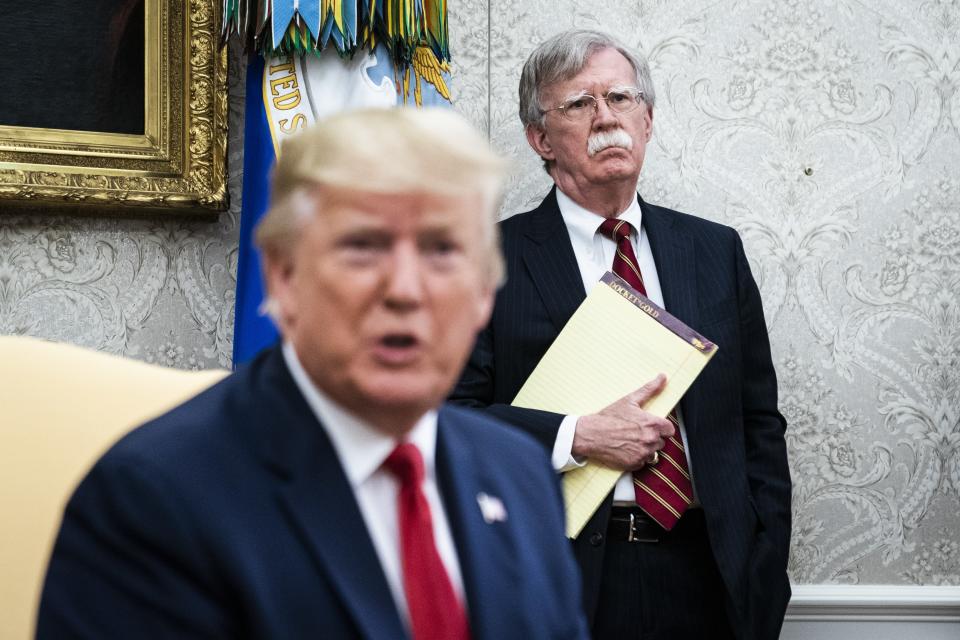Why A$AP Rocky Is a Bit Player in the Impeachment Hearings
On Wednesday morning, his freckled, bald pate glinting under the bright lights, a smirking Gordon Sondland, American ambassador to the European Union, took his turn testifying in the impeachment hearings—then gleefully tossed a half dozen administration members under the bus. “Everyone was in the loop,” he said of President Trump’s push to get the Ukrainian president to announce an investigation into his political rival, Joe Biden. “It was no secret.”
Then Sondland threw in a few references seemingly designed to light up the Twitterverse. Referring to his July 26 phone call with the President in which Trump spoke so loudly a State Department employee sitting with Sondland overheard the President allegedly saying “So he’s going to do the investigation,” Sondland said he couldn’t quite remember what he and the President discussed. It could have been the Bidens, it could have been any number of things. “It’s true that the President speaks loudly at times,” Sondland said in his opening statement. “It’s also true that we discussed A$AP Rocky.”
You’ll recall that in July, the rapper—then jailed in Sweden on assault charges—had captured the attention of Donald Trump, who announced he was in close coordination with Kanye West on the matter, and was doing his very public best to free A$AP Rocky. In fact, the Trump administration might have been more consumed by the rapper than we knew at the time. In his testimony about his talks with Trump in July, Sondland went on to refer to A$AP Rocky another half dozen times. David Holmes, the State Department employee, who heard Sondland’s call with Trump and testified on Thursday added another half dozen—much to the puzzled delight of Twitter, where A$AP Rocky was soon trending nationwide. Sonldland’s reprisal of that bizarre story was the perfect encapsulation of the Trump era: the public latching onto something loud and shiny while something far graver—the impeachment of a sitting president—was unfolding around them.
It is also in large part how we got here. Sonland’s testimony — and his reminder of how distractible we are by the shiny objects — makes one wonder just what it was we were so distracted by in the days when Trump was laying the groundwork for his impeachment.
On July 25, President Trump began his day like he usually does: live tweeting his daily viewing of “Fox & Friends,” which was, as usual, reporting more Trump victories: great poll numbers, great economy, and, on this particular day, a win against the Deep State. The day before, special counsel Robert Mueller had testified before Congress about the conclusions of his two-year investigation into Russian election interference and the Trump campaign’s possible collaboration with the Kremlin’s efforts. The testimony was seen as a flop by Democrats and as a vindication by Republicans—and President Trump. “Yesterday changed everything, it really did clear the President,” Trump tweeted, quoting one of the Fox & Friends hosts. “He wins.”
That afternoon, boosted by this win, Trump decided to flex his Presidential muscle. “Give A$AP Rocky his FREEDOM,” he tweeted. “We do so much for Sweden but it doesn’t seem to work the other way around. Sweden should focus on its real crime problem! #FreeRocky.” He even name-checked Sweden’s prime minister, demanding that he “treat Americans fairly!”
Immediately, Twitter was alight. Some laughed at the absurdity of it: Trump, an old white man who loves golf, not only knowing who A$AP Rocky was but demanding justice for him while he languished in a European jail. Others wondered about the novelty of an American president condemning Sweden. Many remarked on what they saw as Trump’s pandering to African Americans (“Sweden has let our African American Community down in the United States,” he tweeted). “Imagine what Bill O’Reilly would have had to say if Kanye West called up Barack Obama and got the President of the United States to trash another country over a rapper getting arrested for assault,” one Twitter user wrote.
A$AP Rocky was just about the only thing that anyone on Twitter wanted to discuss that day, which was fair enough. And yet, while we were consumed with A$AP Rocky jokes and what-if-Obama-had-done-this condemnations, Trump was doing something far more consequential. That was the day that he had a phone call with Ukrainian president Volodymyr Zelensky in which he asked him for “a favor”—and setting himself firmly on the road to impeachment.
Keeping the public’s attention fixed where he wants is a key Trump tactic. It is the very definition of entertainment: diversion.
We saw it on display as soon as Trump began running for office. In a cycle that has come to feel wearily familiar, Trump would say something so awful—a judge of Mexican extraction was incapable of being impartial, the Muslim mother of a dead American soldier “wasn’t allowed” to talk—that people felt it was impossible not to respond and condemn his extraordinarily racist, xenophobic, misogynistic remarks. Not responding would mean it would stand in the record uncontested. But the problem with responding was that it consumed the media and opposing politicians and the public, tying them down and dragging them into the mud with Trump on his terms. The outrage over Trump’s remarks became its own news cycle, drawing our attention away from things that were harder to understand and harder to cover, things like Trump’s mob ties, his misuse of his charitable foundation, and, well, all those intermittent reports of Russian cyber-meddling. It was only after Trump was elected that many of us realized that some of the most important stuff had happened while we were busy (rightly) reacting to his inflammatory remarks.
So what were we consumed with while, unwitting to us, Trump was committing potentially impeachable offenses? Let’s review key parts of the timeline.
March 24, 2019
What we were consumed with: We spend the month waiting for Mueller to hand in his long-awaited report. On Friday March 21, Mueller finally does so. By Sunday the 24th, Attorney General releases a memo saying that Mueller did not find evidence of conspiracy with the Kremlin and that he would not be bringing charges against the President. The debate about whether this was justified, and whether we’d ever see the full report or hear from Mueller directly, begins. It is fierce and all-consuming.

Former U.S. Ambassador To Ukraine Marie Yovanovitch Testifies At Impeachment Hearing
What we didn’t notice: Donald Trump, Jr., the President’s eldest son and primary campaign surrogate, begins a public attack against Marie Yovanovitch, a career foreign service officer and the U.S. ambassador to Ukraine. We would later discover that this was part of a broader push by Trump’s personal lawyer Rudy Giuliani to oust her because she stood in the way of his plans in Ukraine. He had recently convinced the Prosecutor General of Ukraine Yury Lutsenko to open an investigation into Hunter Biden and Burisma, the Ukrainian gas company on whose board he served, “to curry favor” with the Trump administration. Also, four days prior, Trump began peddling a false theory that Ukraine meddled in the 2016 U.S. Presidential election.
April 21
What we were consumed with: Easter Sunday. Sri Lanka is rocked by a wave of terrorist attacks, which killed over 250 people. Online, people argue about whether we care more about white victims of terror—and what was up with the awkwardly bespectacled Easter Bunny who stood next to Trump on the White House balcony.

What we didn’t notice: Volodymyr Zelensky, a TV comedian and political novice with ties to one of Ukraine’s most powerful oligarchs, wins the Ukrainian presidency in a landslide. Trump calls to offer his congratulations. During the call, Zelensky invites Trump to his inauguration, which would have been a powerful symbol of American support. Trump would instead send a lower-level delegation, led by energy secretary Rick Perry. Things like this, though—public signs of American support for Zelensky, like a White House—would become the official acts that Trump would dangle in front of the Ukrainians in exchange for Ukrainians investigating Trump’s personal political rivals.
May 23
What we were consumed with: After blowing up at a meeting with Democratic Congressional leadership, Trump tries to reset the narrative and claims he was, in fact, “extremely calm.” Pressure is mounting on Speaker of the House Nancy Pelosi to open an impeachment inquiry and Trump spends the day bashing Democrats as “THE DO NOTHING PARTY!”

TOPSHOT-US-POLITICS-GENERAL ASSEMBLY-DIPLOMACY-Ukraine-climate
What we didn’t notice: The American delegation returns from Zelensky’s inauguration and fills Trump in on their trip. According to Sondland, the Ukrainians have two asks for Trump: a phone call and a White House meeting between the two presidents. Trump is unresponsive and skeptical of the Ukrainians, repeating that Ukraine “tried to take him down” in 2016. He wants them to “talk to Rudy.” He is referring to Rudy Giuliani, his personal lawyer, who does not work for the U.S. government but has been running a separate diplomatic channel to Ukraine.
July 10
What we were consumed with: Jeffrey Epstein. As revelations broke about new sex trafficking charges against Epstein, we learn that Trump’s labor secretary, Alex Acosta, had been a Florida prosecutor who had arranged a pretty lenient plea deal for Epstein in 2008. (Despite allegations that Epstein solicited girls as young as 13, Acosta’s plea deal gave Epstein only 13 months in jail and immunity from federal prosecution.) Trump spends the day defending Acosta, saying he is doing a “fantastic job” and that he feels “very badly” for him. (Acosta will resign three days later.)

What we didn’t notice: Two advisors to President Zelensky arrive at the White House to meet with Sondland, national security advisor John Bolton, Ukraine special envoy Kurt Volker, the White House’s top advisor on Russia, Fiona Hill, along with Alexander Vindman, another member of the president’s National Security Council. Sondland brings up Burisma and pushes the Ukrainian visitors on opening an investigation into the Bidens. Bolton cuts the meeting short and privately tells Hill that he is “not part of whatever drug deal” is being hatched.
And, of course, on July 25, as we puzzle over Trump’s celebrity-studded, reality-television approach to diplomacy and a rapper’s release from prison in Sweden, the event that might undo his entire presidency was taking place, just out of the public eye: a phone call in which Trump asked Zelensky to “look into” what Hunter Biden did in Ukraine and into the bogus conspiracy theory that Ukraine tried to help Hillary Clinton win the election.
This is the dilemma of the Trump presidency: Trump provokes us in exactly the ways we cannot—and should not—resist. We cannot not be outraged when Trump, who stands accused of rape, sexual assault and harassment by some two dozen women, again takes the side of the people who protect sexual predators. We can not ignore when Bill Barr, the country’s chief law enforcement agent, distorts the Special Counsel’s report. Nor can we not be amused when Trump tries to curry favor with black voters by trying to free a rapper arrested in Sweden.
We’ve gotten better and faster at discovering the things we missed under the frothy surface of the latest Trump outrage, but it’s hard not to wonder: What if we never heard about the July 25 phone call? What other surreptitious moments of this presidency have we missed? What might we be missing now?
An earlier version of this story incorrectly referred to Labor Secretary Alex Acosta as Jim Acosta.
Julia Ioffe is a GQ correspondent.
Originally Appeared on GQ

